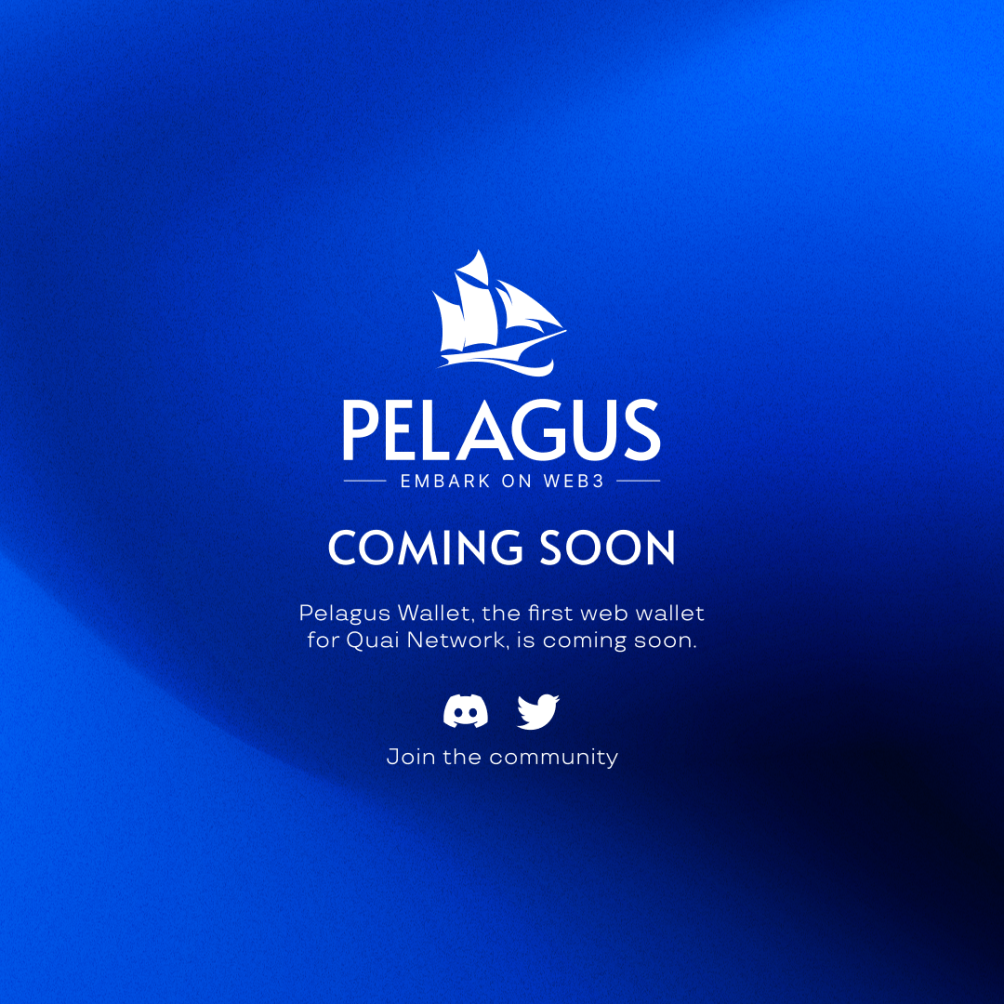
We are excited to announce that Pelagus Wallet, a new open-source software wallet, will support Quai Network starting in the Iron Age Testnet. We are anticipating Pelagus to be launched on Edge, Chrome, Brave, and Firefox.
What is the Pelagus Wallet?
Pelagus Wallet is an open-source wallet for use on Quai Network. Pelagus Wallet is a browser extension that is currently available on Github, and will be submitted to the Edge, Chrome, Brave, and Firefox stores for more general use.
As an open-source product, all code used in Pelagus Wallet can be independently audited and verified by any users. Further, Pelagus Wallet will maintain the spirit of open source software by fielding software updates and upgrades from independent contributors.
What can Pelagus Wallet do?

Currently, Pelagus Wallet contains all features that most cryptocurrency users would deem “essential.” Pelagus Wallet supports:
- Creating accounts
- Importing accounts
- Receiving transactions
- Sending transactions
- Variable gas
- Importing ERC-20 tokens
- Receiving ERC-20 tokens
- Sending ERC-20 tokens
- Saving contacts
- Switching networks (e.g. from the Garden Dev Network to the Colosseum Test Network)
- Smart contract/dapp interactions (i.e. signings, mintings, connecting accounts)
- Linkouts to QuaiScan
Contributions from open-source developers are highly encouraged in order to ensure that Pelagus Wallet is battle-tested and contains the features that its users want.
Some things that Pelagus Wallet does NOT yet support include:
- ERC-721s/NFTs
- Creating/deleting addresses within an account
- An expanded/full page view
- Hardware wallet integrations
- Currency conversion
While Pelagus Wallet is still in its early days, it is already a practical and functional product designed to be used and improved throughout Quai Network’s upcoming Iron Age Testnet.
How to get involved with Pelagus Wallet
As an open-source project, Pelagus’ development will be powered by its community of users. Start connecting with the Pelagus community to suggest features/improvements, work on updates, and more:
If you’re a developer looking to propose an improvement to Pelagus Wallet, you can open a PR in the Pelagus Wallet Github Repository.
What is Quai Network?
Quai is a pre-launch cryptocurrency powered by Quai Network. Quai Network is the first blockchain protocol that is simultaneously decentralized, censorship resistant, and infinitely scalable. Quai Network, in contrast to traditional single-chain blockchains, functions as a network of many interoperable blockchains braided together. Due to a breakthrough discovery that occurred during research on Proof-of-Work, Quai Network utilizes a new consensus mechanism, Proof-of-Entropy-Minima (PoEM), which eliminates all consensus-based forks, and enables all Quai Network nodes to remain in “perpetual consensus.”
Join us to build a better blockchain.
Quai Network is an open-source Proof-of-Entropy-Minima blockchain network utilizing the capabilities of merged mining to increase throughput and security. Users of Quai Network will enjoy fast transaction times without compromising decentralization and security. Miners will have competitive mining opportunities across the many blockchains within the network.
Capable of thousands of transactions per second, the Quai Network is a new solution to scalability that is soon to be ready for mainnet release.
Terms & Conditions / Disclaimer
The entirety of the Quai Genesis grants program, including the content of this article, is subject to the Terms and Conditions outlined here.
Opinions, ideas, and statements shared in this update are delivered with numerous assumptions, risks, and uncertainties which are subject to change over time. There are multiple risk factors, including those related to blockchain, cryptographic systems, and technologies generally, as well Quai’s business, operations and results of operations, that could cause actual results or developments anticipated not to be realized or, even if substantially realized, to fail to achieve any or all of the benefits that could be expected therefrom. We reserve the right to unilaterally, completely, or partially change plans, expectations, and intentions stated herein at any time and for any reason, in our sole and absolute discretion, and we undertake no obligation to update publicly or revise any forward-looking statement, whether as a result of new information, future developments, or otherwise. ACCORDINGLY, WE RECOMMEND THAT YOU DO NOT RELY ON, AND DO NOT MAKE ANY FINANCIAL DECISION OR INVESTMENT BASED ON, THE STATEMENTS CONTAINED IN THIS UPDATE OR ANY OF OUR UPDATES/ARTICLES — INCLUDING BUT NOT LIMITED TO ANY SELLING OR TRADING OF QUAI TOKENS, ETHER, OR ANY OTHER CRYPTOGRAPHIC OR BLOCKCHAIN TOKEN, OR THE SECURITIES OF ANY COMPANY.
The views, opinions, and statements made in this update are those of an individual author and not those of any institution, University, or legal entity operating within the jurisdiction of The United States or beyond. There is no association between these views, opinions, and statements and any for-profit or non-profit entity, particularly with Universities, Foundations, and other Agencies located within the United States. Any perception of such an association is purely accidental, and will be rectified immediately if brought to our attention by the reader.
